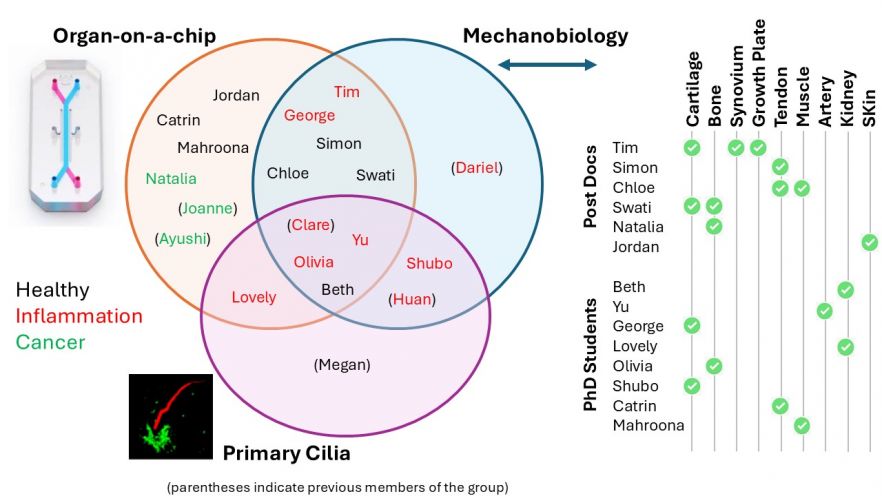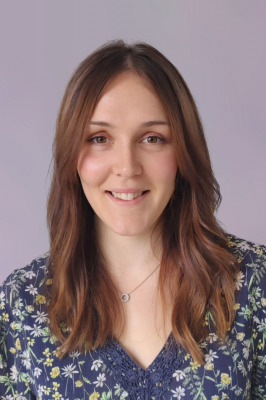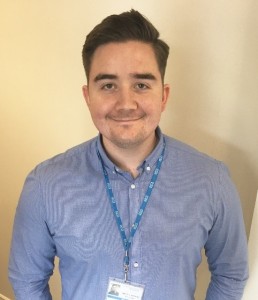Prof Martin Knight
BEng, MSc, PhD, FHEA
Research Group Members
Prof Knight has a large multidisciplinary research group with expertise including biomedical engineering, mechanobiology, cell biology, and organ-on-a-chip technology. We work on applications related to a variety of diseases and tissues as shown below. The group includes multiple post docs and PhD students. We also have a strong track record of hosting research fellows funded via various routes including EU Marie Curie Fellowships, Versus Arthritis Fellowships, etc.
Please contact Martin if you are applying for funding and are interested in joining the group as either a post doc or PhD student.

Research Assistants
 SHAH, Miloni |  GROSSEMY, Simon |  STEWART, Chloe |  HOPKINS, Timothy |
 MIDHA, Swati |
Current PhD Projects
| Thesis Title |
|---|
| Developing In-Vitro Models of Tendon Ageing |
| Development of a Polycystic Kidney Disease organ-chip model to study therapeutic regulation of primary cilia mechanobiology |
| Development of an Organ-chip Model to examine Muscle Degeneration |
| Development of organ-chip models of the growth plate with mechanical stimulation |
| Development of organ-chip to study the role of mechanobiology in arterial inflammation |
| Development of osteochondral organ-chip model SEMS-PHD-624 |
| Exploring tendon health and disease with tendon-on-a-chip models |
| Long-term Tracking and Targeted Therapy of Mesenchymal Stem Cell Labeled Nanoparticles |
| Mechanical, inflammatory, and pharmaceutical regulation of cell polarity and the role of primary cilia in a human kidney-organ chip model |
| Nanoscale deformation mechanics in the bone-cartilage unit |
| organ chip model development- - integrating mechanobiology |
| Organ-chip models of bone health and ageing to study the impact of air pollution and systemic inflammation |
| The Effect of Inflammation on Chondrocyte Mechanosignalling |
| THE ROLE OF OSTEOCYTE MECHANICAL LOADING ON BONE RESORPTION |
Completed PhD Projects
| Thesis Title | Year |
|---|---|
| Investigating the influence of synovium on cartilage response to inflammatory stimuli using predictive invitro models. | 2024 |
| Novel Models of Tendinopathy on a Chip | 2024 |
| A Single Cell Analysis Approach for Viscoelastic Characterization Using Microfluidics. | 2023 |
| Biophysical biomarkers to characterize cancer-associated fibroblasts in breast cancer | 2023 |
| The role of YAP and primary cilia in regulating inflammatory responses of cartilage | 2023 |
| High throughput confocal screen of 1727 compounds to identify novel regulators of primary cilia structure | 2022 |
| Synthesis of hybrid perovskite single crystals and study of their optoelectronic and photonic properties with nano/microstructures | 2021 |
| The role of phosphorylation Ezrin in regulating the relationship between biophysical properties and cell migration | 2020 |
| Mircrofluidic-based Model of the Microvasculature to Study the Impact of Glycocalyx on Angiogenesis | 2019 |
| The role of primary cilia in the anti-inflammatory effects of mechanical loading in cartilage cells. | 2019 |
| Nanoscale mechanics of collagen in articular cartilage | 2018 |
| The effects of cobalt and chromium ions and nanoparticles on macrophage and fibroblast behaviour | 2018 |
| The role of primary cilia in tendinopathy | 2018 |
| Roles of primary cilia in hMSC in differentiation | 2016 |
| The effects of the rate of hypo-osmotic challenge and IFT88 mutation on the biomechanics of chondrocytes. | 2016 |
| Mechanical properties of stem cells using micropipette aspiration | 2015 |
| Accelerated wear protocols for understanding clinical wear in modern hip prostheses | 2014 |
| Interaction between primary cilia length and hedgehog signalling in response to mechanical and thermal stress | 2013 |
| Nuclear Related Responses to Osmotic Challenge in Chondrocytes | 2013 |
| Viscoelastic Response of Cells and the Role of Actin Cytoskeletal Remodelling | 2012 |
| Development of a non-invasive method to detect pericellular spatial oxygen gradients using FLIM | 2011 |
| The potential of pulsed low-intensity ultrasound to stimulate chondrocytes in a 3D model system | 2009 |
| Calcium mediated signalling pathways for chondrocytes in 3D constructs subjected to cyclic loading | 2006 |
| Modulation of the effect of tensile strain on fibroblasts by extracellular matrix molecules and serum | 2006 |

